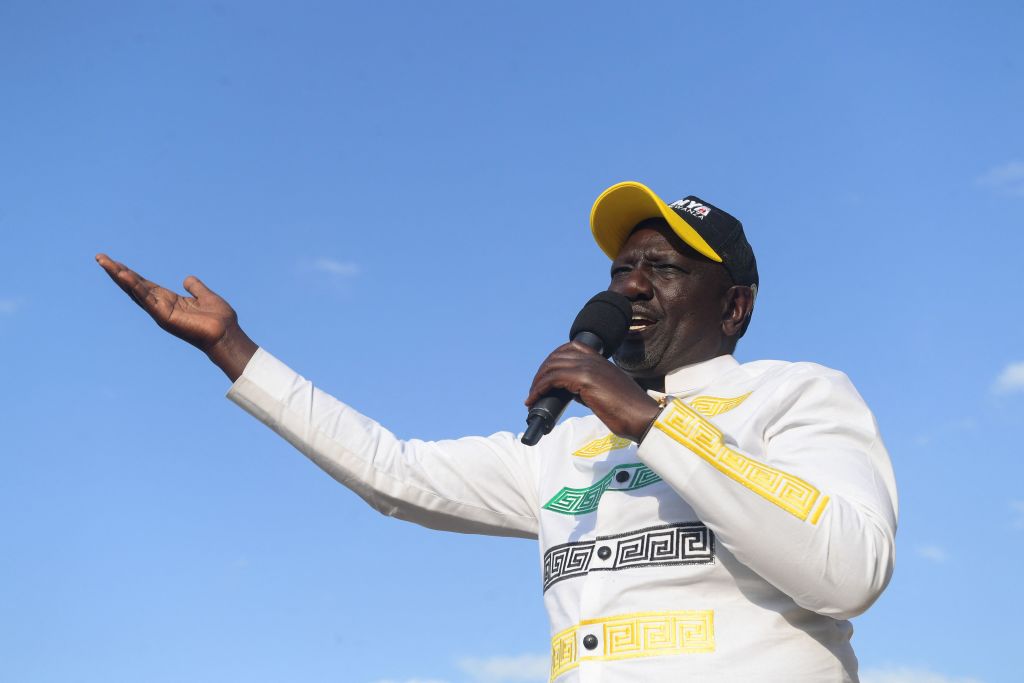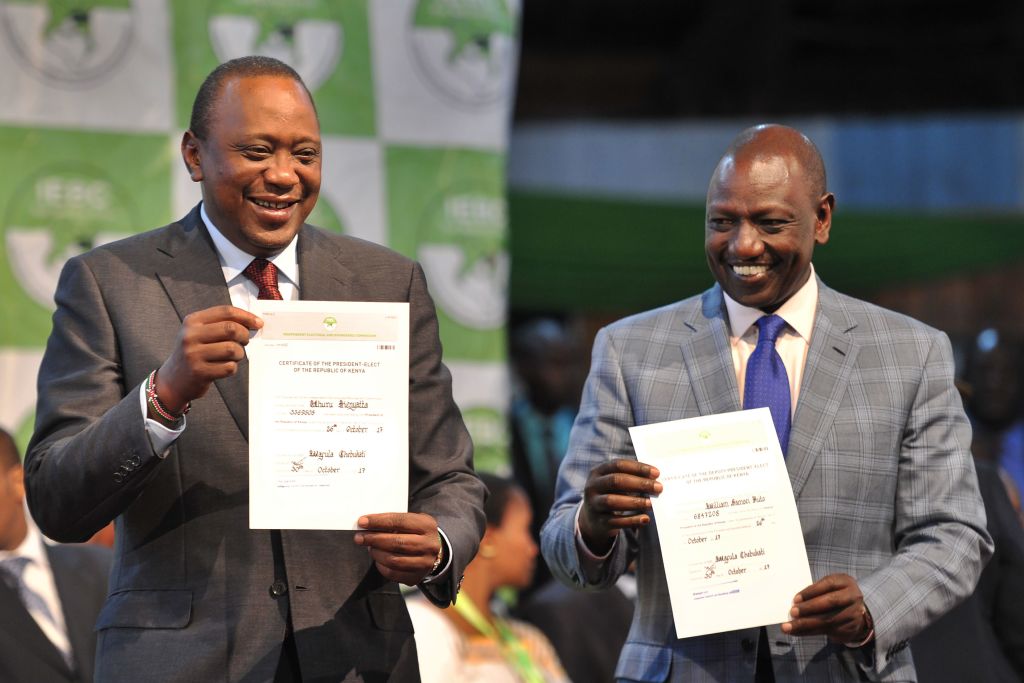KEnya tweeted on Tuesday about rising food and fuel prices, a severe drought, and concerns over whether the votes will reflect crucial concerns. Head to the polls to elect a new president for the country in Freedom, Justice and Peace.
There is particular concern about how the Independent Electoral Boundary Commission, which is responsible for running Kenya's elections, will manage the process. "They are far from professional," said Ken Opalo, an associate professor of foreign affairs at Georgetown University. This year will be the first major test for Kenya's electoral system since his chaotic 2017 elections.
Voting is open from 6am to 5pm. Local time and the race are still too close to call. The Election Commission may take up to seven days to tally the votes. If no candidate wins an absolute majority, there will be an unprecedented runoff vote.
Who are the candidates running for President of Kenya?
With four candidates running, the front-runners are veteran opposition leader Laila Odinga, 77, and current Vice President William Root, 55. term limit.
Odinga, of the center-left Orange Democratic Movement, is running for president in her fifth run, saying it will be her last. He is competing under the uneasy Azimio La Umoja alliance, which includes the right-wing Jubilee Party led by the current president. He was the son of the country's first vice president, and he served several years as a political prisoner in the 1980s and early 1990s.
One of Odinga's key policy proposals is a social welfare program in which he will deliver his 6,000 Kenyan shillings ($50) a month to the most needy households in the country. promises. This will significantly increase the amount of cash assistance provided to families through existing welfare programs. He also promised to establishuniversal health care through a program called Babacare,
poor and young, and a "hustler he is a nation." I even made up words. This is a nod to his humble beginnings as a chicken seller during his teenage years. He was Minister of Agriculture before becoming Vice President in 2013,and is considered one of the largest corn farmers in the country. Indicted by the International Criminal Court in connection with ethnic violence. ,later dropped against both individualsthe ICC cited insufficient evidence, but refused to acquit either Kenyatta or Ruto. did.

Kenyan vice president and presidential candidate William Ruto speaks at the Nyayo National Stadium in Nairobi on August 6, 2022, on the final day of his campaign ahead of the Kenyan general election on August 9.
Simon Mina - AFP via Getty Images
The focus is on expanding access to credit in the formal sector.
Other presidential candidates include wild card George Wajakoya ( professor and attorney) and David Mwaure his Waihiga (also an attorney). After being homeless as a child, Hare Wajakoya, who was taken in by a worshiper of Krishna, has sparked controversy over the legalization of marijuana. Waihiga is also a clergyman whoproposed halving income taxes
What are the major issues at stake in Kenya's elections?
"What worries most Kenyans considering these elections is the cost of living crisis," said one of his analysts at Chatham House, who studies Kenya. Ferguskell says. “There is a lot of pressure on ordinary Kenyans,” he adds. In recent months,inflation has surged from to , reaching 8.3%, and the war in Ukraine has led to long lines at gas stations and food shortages. Prices of essential items such as Corn flour and cooking oil.
Kenya is also grappling with the worst drought in more than 40 years, according to the United Nationswhich is devastating in terms of food insecurity, especially among pastoralist communities. Confusion and mortality.
READ MORE: How Kenya Coping with Thousands of Displaced Climate Migrants
Kenya has remained unchanged in the last few elections, with party manifestos largely the same. It fights corruption and lifts people out of poverty," says Gilbert Cadiagara, professor of international relations at the University of the Witwatersrand in South Africa. He adds that what is often the determining factor is the loyalty of voters to their ethnic group.
Neither Odinga nor Ruto belong to the Kikuyu, the country's largest ethnic group, but both chose the Kikuyu as their vice-presidential candidates. Odinga chose former Justice Minister Martha Kahlua as his vice-presidential candidate. If she wins,she will become Kenya's first female vice-president. , moved forward. “Among the ethnic base of Kenyatta, Odinga actually loses to Root, but Kenyatta helped Odinga create a national coalition,” says Oparo of Georgetown. "Without Kenyatta's support, Odinga would not have been able to build the broad national coalition he was able to put together."
Kenya's Turbulent Election History
In August 2017 Kenyatta's first election result of 54% to Odinga's 45% win was overturned by the Supreme Court. And, due to process irregularities, a new vote was ordered. (The court said the first ballot "was not held constitutionally.") The voting system could electronically transmit results from all broadcasters in a timely manner. I didn't. Odinga's attorneys successfully argued that this opened the door to the possibility of vote tampering. (International observers said the election was fair.) Odinga boycotted his re-election in October, and Kenyatta collected his 98% of the vote.
The 2017 election was also marred by allegations of police impunity. Human Rights Watch said on August 1 that Kenyan authorities' failure to address past human rights abuses bypolice would lead toelections this year, especially when the results were contested. He said he was concerned that the risk of impunity could increase. After the 2017 election, Human Rights His Watch and other groups documented 104 killings of him by police and armed groups, with most of the victims being supporters of the major opposition parties at the time.
And he noted that in December 2007, after right-wing National Unity Party President Mwai Kibaki was declared the winner of that year's presidential election against Odinga, the controversy over Kibaki's re-election began in line with ethnic groups. led to weeks of violence. At least 1,000 people have died and more than 300,000 have been displaced. Kibaki's native Kikuyu tribe was the first target of violence following allegations of voter fraud and fraud. But reprisal killings soon followed, especially in the Rift Valley. Kenya enacted a new constitution in 2010 in response to the 2007-2008 crisis, which subsequently brought about the decentralization of power through the creation of47 local governments
Violence has emerged since the 2007 elections, experts say to make it more localized and on a smaller scale.
The changing loyalties of the current president
Unique factors in this presidential election were the conflict between the current president and Vice I support Odinga.
"This is a grand election in the sense that the outgoing president went against the vice president and supported the opposition candidate," says Khadiagala of Witwatersrand.

Next President of Kenya, Uhuru Kenyatta (L) Holding election certificates with Vice Presidential Candidate William Root at the National Tally Center in Bomas, Kenya, October 30, 2017, for repeated presidential ballots by the Chairman of the Independent Electoral Boundary Commission. A winner has been announced. Kenyatta declared victory in the country's deeply divisive elections held on 30 October, with his rival Lyra winning 98% of the vote cast in polls boycotted by his Odinga. won.
Tony Karumba—AFP via Getty Images
In 2018, Kenyatta and Odinga said Kenyans "shake hands"; and cooperated with the Building Bridges initiative, which aims to expand the powers of government agencies. However, Kenya's Supreme Courtdeclared the proposed changes illegal in March,
and their partnership "has been a former alliance of Kenyatta and Root from the outset." "Made possible by the fact that it was a species marriage of convenience," says Kell. Both were indicted by the ICC from 2007 to 2008 in connection with his 2008 post-election violence.
Tensions between Kenyatta and Root have increased in recent years. According to Kell, the vice president has not attended several cabinet meetings and he eventually split from the Jubilee Party he formed with Kenyatta in 2013. some first votes.It is the first time since the country began its transition to democracy in 1992 that it has been without a leading Kikuyu candidate. And Kikuyu's opinion remains divided on both frontrunners. Georgetown's Opalo said, "The election results are going to focus a sizeable ethnic vote on his two leading candidates." "But that doesn't mean we should ignore the fact that ethnicity isn't as front and center this time as it was before."
Kell agrees. “Personality has been reflected in campaigns more than ethnic identity,” he says.
Sanya Mansoor sanya. mansoor@time. com


